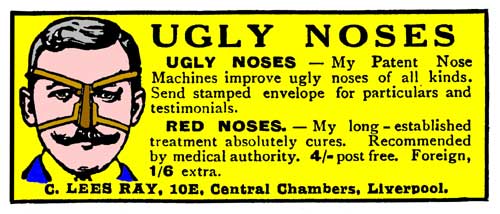More Dilution Delusion, The Purple Plates!, Amusing Ads, Conjuring Concerns, Another Dowsing Dissection, and an Important Puzzling Question.....
 The furor over the BBC Horizon program that bombed on homeopathy back in November, continues apace. As previously discussed, Horizon's experts tried to replicate the experiments of Dr. Jacques Benveniste, the results of which had been accepted and celebrated by the homeopathic community as validation of their claims. Horizon's results were quite negative, and that has provoked much criticism among the believers and proponents, as well as some rather sour comments from Benveniste. He now calls me a "fascist of science" and branded the program an "establishment plot" to sabotage his own work and that of Madeleine Ennis, the pharmacist from Belfast.
The furor over the BBC Horizon program that bombed on homeopathy back in November, continues apace. As previously discussed, Horizon's experts tried to replicate the experiments of Dr. Jacques Benveniste, the results of which had been accepted and celebrated by the homeopathic community as validation of their claims. Horizon's results were quite negative, and that has provoked much criticism among the believers and proponents, as well as some rather sour comments from Benveniste. He now calls me a "fascist of science" and branded the program an "establishment plot" to sabotage his own work and that of Madeleine Ennis, the pharmacist from Belfast.
The BBC has been issuing reports and responses, as I have. To quote from their present web page:
Dr. [Peter] Fisher, the medical director of the Royal London Homeopathic Hospital [and homeopathist to Queen Elizabeth], does not believe that the Horizon programme will dent his patients' belief in the method. It is the one thing on which he and Mr. Randi agree. Mr. Randi said that homeopaths would quickly assimilate any disappointment at the resoundingly negative result. "They all recover from facts," he said. "Reality is not something that bothers these people for very long."
He never seriously thought that he'd have to part with his $1 million — and thinks it unlikely he ever will. "I am a magician, not a scientist. I try to see through people who are deceiving or who are self-deceiving. That is not difficult. We as conjurers know one thing above all, we don't have to fool the people; they fool themselves and they do it very effectively. People — patients and doctors — who not only want to believe, but need to believe it works, will ignore all contrary evidence," Mr. Randi said. "You might as well try to talk the Pope out of being Catholic."
And it goes on and on. I can't wait for someone to come up with the funding for another such test, one in which Peter Fisher, Madelaine Ennis, and Benveniste himself will participate. But then, I was always a dreamer...
From "The Onion" horoscope column...
Virgo: (Aug. 23-Sept. 22): Certain shortcomings in your education and upbringing cause you to read meaning into the relationships among various celestial bodies.
Reader Avital Pilpel opines:
In your latest commentary, you say that it was "unwise" of NASA to cancel a book proving the Moon landing happened, and a good idea to use a VLA telescope to photograph the moon landing. I agree, but not for the reason implied -convincing the conspiracy buffs they are wrong. The conspiracy buffs, it goes without saying, will not be convinced by any evidence. They will simply claim these new photographs are fake, as well. No "Face on Mars" enthusiasts were dismayed in the least when the high-resolution photos from the Mars Orbiter showed the "face" to be — as expected — a hill; they just claimed that these photos are fake.
Yes, as also expected. But I wasn't trying to convince any true believers. As you point out, they're committed to their nonsense, permanently. However, by not handling the controversy directly and strongly, NASA has invoked the possibility that they are really guilty of a grand fraud, and that action tends to feed the delusions of the convinced, as well as create new dupees....
Nevertheless, it would help convince people — not those who are already in the conspiracy, but those who think that there might be something to it — if so many people believe it. And, indeed, it is exactly those people that skeptical education should target on all "paranormal" issues.
Exactly my point, in the first place.
Sid Rodrigues, from the UK, who you can meet at The Amaz!ng Meeting, sends us this notice:
A very big British Rock/pop combo called Supergrass has named their tour after Carl Sagan: "CARL SAGAN TAUGHT US EVERYTHING WE KNOW TOUR." Also their web-site is dedicated to the Hitchhiker's guide to the Galaxy author, Douglas Adams.
A spark of good news. Thanks, Sid!
Reader Daniel Balsom sends us to http://cosmicque.com/purpleplates/ to examine the claim of the incredible Purple Plates, which I'm sure many of you received for Christmas. Dan quotes from the site:
They are made of aluminum (1/16th of an inch thick)... the atoms and electrons of the aluminum have been altered so the plates are in tune, in resonance, or in harmony with the basic energy of nature and the Universe. It is the same energy that causes the particles of every atom and molecule to be in constant vibration. They function as transceivers... creating a field of energy around themselves that will penetrate any material substance by osmosis. This energy may be very beneficial to all life... plant, animal or human.
Says Dan:
Now, we've all heard this nonsense about "vibrational energy" before, but what caught my eye here was that they operate by osmosis! Fascinating, no? It gets even better:
The Purple Plate people claim:
Many reports have come back that the Plates "disappear" or actually dematerialize. How or why this happens is unknown. Sometimes they will reappear at a later date... we have personally had this experience twice! One time the Plate literally disappeared off the face of the planet and then turned up several weeks later. The second time... it has been gone, for ever!
Dan again:
Wow! Although I'm not sure how this helps sell their product, I might hesitate to purchase these miracle osmotic purple plates of power if I feared my investment would simply pop off to tea with Sylvia Browne some day.
No, Dan, the Purple Plates go to join the Other Socks that are folded into another dimension by laundry driers. These are matters far beyond us as mere mortals....
Ten top reasons religious folks should not worry about Harry Potter leading children into witchcraft and the occult:
10. Harry Potter is fictional
9. Harry Potter is fictional
8. Harry Potter is fictional
7. Harry Potter is fictional
6. Harry Potter is fictional
5. Harry Potter is fictional
4. Harry Potter is fictional
3. Harry Potter is fictional
2. Harry Potter is fictional
1. Harry Potter is fictional.
Looking through the two ancient issues I have of "The Strand" magazine for December 1920 and March 1922, I was highly entertained by the commercial ads I saw. And there was no problem ascertaining how they supported the publication financially: 134 of the 252 pages — more than half of the entire magazine! — was solid advertisements! Several caught my eye, none more than the two shown here. One just has to wonder who could possibly believe and invest in these products! Or do I forget "Q-Ray" pendants and magnets-in-shoes.....?


Reader Peter W. Barber is concerned with proper etiquette and ethics for magicians. These matters have occupied the attention of serious performers for years now, though few big improvements have been made. I have resigned from major organizations for the very reason that I cannot accept their refusal or failure to deal with important ethical items that concern integrity of performance. Peter explains his own view:
I'm an American living in Bad Mergentheim, Germany. I hold the Order of Merlin from the International Brotherhood of Magicians, an award given for longevity of membership, and not for talent. I retired from the US Army some years ago and enjoy sitting in cafés drinking cappuccino in real porcelain cups, not something one can often do in the US.
May I take this opportunity to thank you for all your work on behalf of our natural world? You are one of the few, too few, voices for common sense in this world.
When a magician performs for an audience, even an audience of one, the audience is asked to suspend disbelief for the length of the performance. Fiction writers do the same thing. Neither the novelist nor the magician is working within the "real world." As magicians, our make-believe world is a magic world where, assuming we do our parlor tricks well enough, the audience goes along and is entertained, even mystified. They leave the theater, restaurant, party or whatever venue we are working, knowing that we are not in league with the devil or that we have not violated the Laws of Nature. We just did tricks that they don't know how to do.
Well-written, and sometimes not so well-written, fiction does the same thing. The modern novelist tells his public up front that the characters and the situations in which they find themselves are not real. He tells the reader that they should not confuse the characters with any person living or dead. No reasonable person accepts a book of fiction with this disclaimer as a work of non-fiction. In the real world, works of fiction without a disclaimer have often been accepted as fact with disastrous consequences. "The Protocols of the Learned Elders of Zion," and its part in leading to the Holocaust is arguably the most egregious example in history.
As magicians, we do not put a disclaimer in front of our act reminding the public that what they will see and experience is a trick, a swindle or a flim-flam, even though it is. We do not have to tell the audience that we are going to pull the wool over their eyes and do things that are impossible. This is understood. After all, the Statue of Liberty is not really going to disappear, is it? The single sponge ball the magician just put in someone's hand is not capable of spontaneous reproduction, is it?
Why is it necessary for an ethical fiction writer to warn his public that what they are about to experience on the printed page is not real, but not for the magician? Is it ethical for a magician to fool his public without warning, but not for others? In a recent national television program, the magician frst told his audience that he wasn't sure if he could do a certain trick. Of course he did it very well much to the public's amazement. Was he unethical? Of course not. That is part of the magician's act, and is expected.
The subject of ethics in the organized magic community is primarily limited to protecting "The Secrets of the Trade." The International Brotherhood of Magicians [I.B.M.] only addresses ethics in the organization's by-laws by prohibition of exposure of "any magical effect." Not only is it considered unethical when the magician decides to tell or show the secrets of his performance, but an I.B.M. member risks expulsion if he does. I do not doubt that other formal or informal magic organizations hold the same position.
I did a word-search of the I.B.M.'s "The Linking Ring" [journal of the organization] on CD under the word "ethics" and found 621 instances where the word was used in various articles since 1929. Those articles I read, with only two exceptions, addressed the ethics of exposure or the buying and selling of magic equipment from other than the owner/originator of the material. (Here ethics require that I admit to not reading all 621 uses of the word "ethics." I limited myself to the period from 1979 to 1999 plus a 1956 article by Burling (Volta) Hull.)
[I omit here some specific discussions in the account of examples of exposure or usage infractions that concern the I.B.M., but are not pertinent to our interest.]
There is one area of ethics that seems to be overlooked by the magic community. I find almost no consideration has been given to ethical treatment of the public.
I consider that our ethics are also violated when a credulous member of the audience approaches the magician and tells him that he knows the magician has "special powers" and the magician makes no attempt to dissuade this belief. At this point the magician crosses the boundary from entertainer to charlatan. Of course the Professor's Nightmare [a common trick with pieces of rope] is not going to do this. On a larger scale we can also rule out a belief that Roy [of the magic team "Siegfried and Roy"] was really turned into a white tiger. The "special powers" accusation most often happens in a mentalist or spiritualist act.
This thought is not new with me. Reginald Scott more than three hundred years ago wrote, "The conjurer has a responsibility not to abuse the name of God or to pretend to device powers. It is his duty to acknowledge the human nature of his art and to detect and reveal those who do otherwise." More recently Burling (Volta) Hull warned in the March 1956 Linking Ring, "Do not make claims of possessing any 'super-normal powers.'"
James Randi wrote that he gave up doing a mentalist act when too many people wanted private readings from him and could not be made to understand that what he did in his act was just that, his act. Despite his disclaimers that he had no special powers, many people would not and could not understand this. The Amazing Randi not only talks the talk, he walks the walk, as the cliché goes. Through his foundation in Fort Lauderdale, Florida he challenges all those who would claim "special powers" with a one million dollar prize "to anyone who can show, under proper observing conditions, evidence of any paranormal, supernatural, or occult power or event." Perhaps Randi's ethics are what make him Amazing.
Dr. Ray Hyman tells in a 1998 interview published in an issue of the magazine "Skeptic" of his experiences performing a mentalist act while he was still a young man. He told the audience at the beginning that he had no special powers. Still, after the show, women would come up to him and tell him personal things and ask for a personal reading. He was a kid and still people wanted to believe.
The argument is often made that people want to be fooled and we do no harm when we deceive them. After all, isn't deception what magic is all about? Is the magician harming anyone when he tells an audience member that they "will experience adversity in the future, but will overcome it and find happiness"? As in most questions of ethics, the answer is not as easy to divine as whether the letter "R" has any meaning to an audience member.
I read recently David Blaine's book, "Mysterious Stranger." Even though I pride myself on my skepticism in the paranormal, I must admit that I was taken aback when David did a cold reading of me as the reader of his book and perceived that I have a scar on my left knee. Wow! How could he know that I had a knee replacement? Has David Blaine "special powers"? Of course not, since as David explains in his book, most people have a scar on their left knee.
"Cold reading" in a magician's act is as old as magic itself. There is no more harm in it than pulling a rabbit from a hat. But it is no longer just an act, no longer entertainment, when the magician crosses the line and makes no effort to dissuade the public of his "special powers." At that point, I contend, the magician is no longer entertaining his audience; rather he is deceiving them under false pretenses. Those who prey on the credulous are stealing from them. The magician who uses those incapable of critical thinking for his own ends, whether it is for money or ego, is committing an unethical act and should be treated no differently than a magician who steals another's illusion. Responsible, ethical, magicians must expose these people for what they are.
By exposing, I do not mean revealing the principals of cold reading — or of palm reading, for that matter. I simply mean that when asked if someone can really bend spoons with their mind or talk with the dead, that we must do a simple demonstration and explain that it is a trick. Mind-reading seems mysterious to the layman because we know how it's done, and he doesn't. Can we protect everyone from charlatans? No, of course not. Some people, for whatever reason, cannot or will not accept a reasonable explanation. They prefer blind belief in the paranormal, to a rational explanation. All we can do is our best for our art.
I thank Peter Barber for this expression of his opinion. I'm sure he'll be receiving some grumpy notes from colleagues, but I can assure him that he'll get over that bump. And he should know some of the bumps I've had to maneuver over the years.....!
A reader identified only as "Pete S." writes:
I read with interest your comments on dowsing. Years ago, as a teenager (I am 67) I had a friend show me how to do it, and was astounded that something in fact did happen. Since I could not believe in such things, I tried to puzzle out why it did. I was using the method that requires you bend the forks of a twig back on themselves and hold the whole business parallel to the ground. It takes some force to hold it that way — it tends to spring either up or down, and you have to squeeze hard to maintain the parallel orientation. What I discovered is that when the point moves up you obviously adjust it so it stays parallel. But when it moves down, the response is to squeeze harder, and that usually makes the wrist bend the hand slightly toward the pinkies, which bends the stick more and makes it go down even harder. It is, as you say, a very strong, eerie, feeling. The crossed wires tend to work the same way — altering the squeeze alters the wrist position and causes them, usually, to cross.
The other thing I wanted to say, as a former professor of pharmacology, is that it always amazes me that people who believe in "alternative" medicine will not ask for the same degree of proof for that, as they do for scientific medicine. They never do it, and I have gotten some of them rather angry with me for suggesting it. People are interesting, are they not?
Thanks, for both the wonderful explanations you have given us, and the entertainment, as well. I well remember seeing on television some years back, the moving pencil trick not working when the plastic peanuts were there. "Bad vibes," as I recall. I have done the trick for friends and gotten amazement!
Not "bad vibes," Pete, but "static electricity," was used as the excuse. However, if a static charge had been present, which it was not because I'd grounded the equipment, that would have facilitated the trick, rather than defeating it....!
 I could begin by saying that this will astonish you, but I'm sure it won't. Go to http://www.earthbounddog.com/ and see the latest in personal protection. It's a tag that identifies you after you've been taken aboard a UFO and abandoned somewhere in space, sort of like the note that Mom used to tuck in your pocket when you went on a school field trip or hike. Or like a dog tag...
I could begin by saying that this will astonish you, but I'm sure it won't. Go to http://www.earthbounddog.com/ and see the latest in personal protection. It's a tag that identifies you after you've been taken aboard a UFO and abandoned somewhere in space, sort of like the note that Mom used to tuck in your pocket when you went on a school field trip or hike. Or like a dog tag...
And here's a gag product — I hope! — that pokes appropriate fun at John Edward. Can't have too much in the way of showing just how seriously we should take this clown and his scam, in my opinion.

Speaking of "cold readers," one in the UK is doing very well these days. He's Colin Fry, with the same act as Edward, Browne, and Van Praagh are doing, in this country. A believer recently sent in a puzzled observation to a "psychic" website in the UK:
It's my first time here and I just want to say that I think Colin Fry is brilliant. However, one question that puzzles me & I hope you people can help! I've just been watching his programme "Sixth Sense" on TV. He asked a general question to the whole audience but the camera focused on the person who answered before they made themselves known. Are the cameramen psychic too? Even the makers of "live" shows like "Question Time" take a good few seconds to home in onto the individual! Something not quite right here!!!
Good observation! And I agree with your puzzlement... Another fan sent in this commentary:
Having been on television quite a lot, I can say from experience that there is so much that is fake, and I find it very disappointing. There is no such thing as a truly "live" show, the amount of planning that goes into live shows is huge, particularly the ones that are actually trying to be convincing. I could say more but it is probably not the best thing to do, [libel?] but friends who have been with me were amazed at how staged it all is.
Reader John Atkinson added:
One of the TV psychics (Edward?) had a good method. A few weeks before the show was taped, he sent out people into the community to take a survey. When these survey people were in the house, they'd take a good look around and also get as many names as they could. They already had the address. A few days later, an invitation to the studio would arrive. No one tied the two events together. When these people were in the studio, unknown to them, they were assigned seats according to their address. It was now a trivial matter for the "psychic" to seem to know a lot about them. The fraud was discovered when a few people switched seats before the show was started, and that caused a lot of embarrassment for the "star" of the show.
Closing with a quotation from one of my favorite philosophers, I'll remind you that I'm away in Korea until the 19th of this month...
He was so learned that he could name a horse in nine languages; so ignorant that he bought a cow to ride on.
– Benjamin Franklin.
I'll try to keep new material coming up here. Bear with me, please.

 The furor over the BBC Horizon program that bombed on homeopathy back in November, continues apace. As previously discussed, Horizon's experts tried to replicate the experiments of Dr. Jacques Benveniste, the results of which had been accepted and celebrated by the homeopathic community as validation of their claims. Horizon's results were quite negative, and that has provoked much criticism among the believers and proponents, as well as some rather sour comments from Benveniste. He now calls me a "fascist of science" and branded the program an "establishment plot" to sabotage his own work and that of Madeleine Ennis, the pharmacist from Belfast.
The furor over the BBC Horizon program that bombed on homeopathy back in November, continues apace. As previously discussed, Horizon's experts tried to replicate the experiments of Dr. Jacques Benveniste, the results of which had been accepted and celebrated by the homeopathic community as validation of their claims. Horizon's results were quite negative, and that has provoked much criticism among the believers and proponents, as well as some rather sour comments from Benveniste. He now calls me a "fascist of science" and branded the program an "establishment plot" to sabotage his own work and that of Madeleine Ennis, the pharmacist from Belfast.


 I could begin by saying that this will astonish you, but I'm sure it won't. Go to
I could begin by saying that this will astonish you, but I'm sure it won't. Go to 
